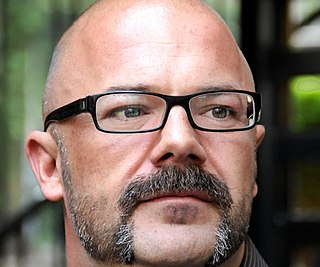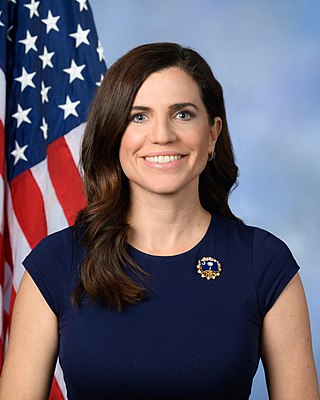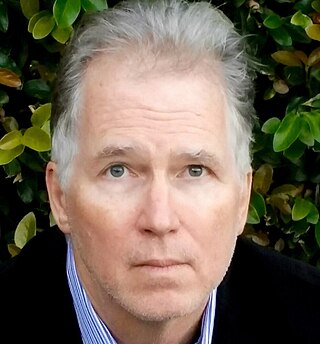William Saletan | |
|---|---|
 Saletan at New America discussion in 2017 | |
| Nationality | American |
| Alma mater | Swarthmore College |
| Occupation(s) | Writer, national correspondent |
William Saletan is an American writer for The Bulwark .
William Saletan | |
|---|---|
 Saletan at New America discussion in 2017 | |
| Nationality | American |
| Alma mater | Swarthmore College |
| Occupation(s) | Writer, national correspondent |
William Saletan is an American writer for The Bulwark .
Saletan, a Jewish native of La Porte, Texas, [1] graduated from Swarthmore College in 1987. [2]
Saletan has written extensively about abortion, arguing that it should be legal but should also be avoided, if possible, through the use of contraception. In 2004, he wrote that "the fetus is a distinct human entity deserving of legal consideration." However, he distinguished this from "personhood," which he said might not be conferred until viability. [3] In 2009, he opposed new laws against abortion, claiming that they would lead to "hypocrisy, deceit, interrogations, [and] amateur home surgery." He rejected the proposition that abortion was equivalent to murder, and he concluded that "the person best situated to make the right decision is the pregnant woman." But he also called abortion "the destruction of a developing human being. For that reason, the less we do it, the better." [4]
In later years, Saletan turned his attention to contraception. In 2009, he wrote, "A culture of life requires an ethic of contraception. Birth control isn’t a sin ... It’s a loving, conscientious way to prevent the conception of a child you can’t bear to raise and don’t want to abort." [5] In 2015, he advocated for long-acting reversible contraceptives as a way to reduce the prevalence of abortions. He advised opponents of abortion rights: "You can wait till a woman is unhappily pregnant and then try to thwart her will, or you can work with her before she’s pregnant—when she doesn’t want an abortion any more than you do—to avert that crisis." [6]
Saletan has argued that homosexuality is morally equivalent to heterosexuality but that committed sexual relationships are morally preferable to casual sexual relationships. In 2003, he wrote, "I’m a lifestyle conservative and an orientation liberal. The way I see it, stable families are good, homosexuality isn’t a choice, and therefore, gay marriage should be not just permitted but encouraged." [7] In a subsequent article entitled, "It’s the Commitment, Stupid," he advised conservatives to accept same-sex marriage because "if you want family values, the simplest thing to do is to let people form families." [8]
In 2013, Saletan criticized what he described as a double standard. He asserted that some conservatives opposed same-sex marriage on the grounds that same-sex couples could not conceive children together, but that they did not apply that rule to infertile opposite-sex couples. He wrote: "Once you acknowledge that homosexuality is involuntary and immutable, you can start to think about it the way you think about infertility." He concluded that same-sex marriage, like marriage between a man and woman who could not conceive children together, "domesticates sex and affirms the simple values of commitment and mutual responsibility." [9]
In 2014, at a debate hosted by the Fixed Point Foundation, a conservative organization, Saletan presented a case for same-sex marriage. [10] Later, he summarized his argument in Slate, writing that homosexuality was not harmful and could not be a sin "because it isn’t a choice." He expanded on his critique of procreative ability as a prerequisite for marriage, writing: "We don’t ask infertile straight couples to divorce or break up so they can go have a baby with someone else. We shouldn’t do that to gay couples, either." He also advised conservatives to think of homosexuality not as an orientation toward people of one's own sex but as an orientation toward men or toward women, like heterosexuality. From this point of view, he proposed, homosexuality is a relatively rare circumstance in which "people who are oriented toward women are born female," or "people who are oriented toward men are born male." [11]
In 2002, Saletan wrote that the George W. Bush administration had failed to prove its asserted connections between Iraqi President Saddam Hussein and al-Qaeda. In addition, he expressed concern about "an American policy of trigger-happy pre-emption." But he argued that non-intervention in Iraq's nuclear program was also dangerous. [12] During the United States Senate debate over whether to authorize the use of force in Iraq, Saletan described the authorization as leverage that could pressure the United Nations Security Council to enforce its resolutions against Iraq. He concluded that although he distrusted Bush, he would support the authorization because "I don’t trust the French, Russian, or Chinese governments to do anything to Iraq that interferes with their commercial or political interests." [13]
In 2004, in the wake of revelations that the administration had overstated evidence of Iraq's weapons programs, Saletan criticized Bush for "exaggerations wholly unnecessary to the punishment of Saddam for his noncompliance with U.N. inspections." [14] In 2008, he wrote an article entitled, "How Did I Get Iraq Wrong?" He continued to argue that because Saddam had been "jerking around the [weapons] inspectors," some kind of military intervention had been required to show that the global community was serious about "an enforceable international system to police WMD." But he conceded that Bush's use of force exceeded that basis for action, writing: "If that was the rationale for going in, why disband the Iraqi army? Remaking Iraq was more than the offense justified and more than we could handle." Saletan concluded that he had erred by entrusting the use of force to an unfit president: "You have to decide whether you trust the administration, not just the idea of the war." [15]
In a series initially posted on November 18, 2007 on Slate.com, Saletan assessed the relationship between race and intelligence, specifically the question of whether race is a genetically determining factor in intelligence. He ultimately did not discount the hypothesis that it is, concluding: "When I look at all the data, studies, and arguments, I see a prima facie case for partial genetic influence." [16]
Counterarguments were subsequently published by Richard Nisbett [17] in The New York Times , Stephen Metcalf [18] in Slate and Malcolm Gladwell [19] in The New Yorker .
Saletan's fourth entry in his series, entitled "Regrets", acknowledged overlooking ties between one of his primary sources, J. Philippe Rushton, and advocates of white supremacy, saying, "I was negligent in failing to research and report this." [20]
In subsequent articles, Saletan reconsidered this subject and argued against racializing discussions of intelligence. In 2008, he called race, as a category of analysis in medical or other biological studies, "the stone age of genetics." He defined scientific racism as "looking and settling for racial analysis when some other combination of categories—economics, culture, genetics—more accurately fits the data. It’s easy to group people by race and compare averages. But it’s pernicious." [21] In 2012, he wrote that "drawing inferences about anyone based on race, sex, religion, or any other crude category is a lousy substitute for inspecting or interacting with that individual." He criticized the application of stereotypes, calling them "an ignorant person’s weak substitute for knowledge." [22] In 2013, he examined sources of racial prejudice and advised readers to reflect on their biases. [23]
In 2018, when the race-IQ controversy resurfaced, [24] Saletan revisited his 2007 series, dissected his errors, and advised others not to repeat them. He wrote that "using racial data to make genetic arguments isn’t scientific," because "genes are the mechanism under discussion," and "genes flow between populations as they do between families, blurring racial categories and reshuffling human diversity." He defended the study of genetic factors in intelligence but cautioned that extrapolation from genetic to racial comparisons "overextends the science" of intelligence. He concluded that framing the biology of intelligence in racial terms, as opposed to genetic terms, does more harm than good. [25]
In 2015, when Donald Trump emerged as a leading candidate for the Republican presidential nomination, Saletan described him as "a mean, angry, vicious person" and a "remorseless expert in manipulating ... bigotry." [26] In March 2016, Saletan called Trump "a clear and present danger" who had "little regard for human rights or the Constitution." [27] In May 2016, Saletan accused Trump of 10 offenses that in his view rendered the candidate unfit for the presidency, including "banning Muslims," "stereotyping Latinos," "practicing group blame against blacks," "inciting violence," "advocating torture," "rationalizing plunder," and "targeting civilians" in proposed military strikes. [28]
During Trump's presidency, Saletan wrote additional articles accusing Trump of bigotry, [29] collaboration with Russian President Vladimir Putin, [30] service to other dictators against the United States, [31] and fatal mismanagement of the coronavirus pandemic. [32]
Saletan is the author of Bearing Right: How Conservatives Won the Abortion War, first published in 2003. [33] The book chronicled political battles over abortion from the 1980s to the 2000s, concentrating on parental notification laws and prohibitions on public financing of abortions. According to the introduction: "The people who hold the balance of power in the abortion debate are those who favor tradition, family, and property. The philosophy that has prevailed—in favor of legal abortion, in favor of parents’ authority over their children's abortions, against the spending of tax money for abortions—is their philosophy. People who believe that teenage girls have a right to abortion without parental consent, or that poor women have a right to abortion at public expense, have largely been defeated. Liberals haven't won the struggle for abortion rights. Conservatives have." [34]

James Clayton Dobson Jr. (born April 21, 1936) is an American evangelical Christian author, psychologist, and founder of Focus on the Family (FotF), which he led from 1977 until 2010. In the 1980s he was ranked as one of the most influential spokesmen for conservative social positions in American public life. Although never an ordained minister, he was called "the nation's most influential evangelical leader" by The New York Times while Slate portrayed him as a successor to evangelical leaders Jerry Falwell and Pat Robertson.

David Brooks is an American conservative political and cultural commentator who writes for The New York Times. He has worked as a film critic for The Washington Times, a reporter and later op-ed editor for The Wall Street Journal, a senior editor at The Weekly Standard from its inception, a contributing editor at Newsweek, and The Atlantic Monthly, in addition to working as a commentator on NPR and the PBS NewsHour.

Andrew Michael Sullivan is a British-American author, editor, and blogger. Sullivan is a political commentator, a former editor of The New Republic, and the author or editor of six books. He started a political blog, The Daily Dish, in 2000, and eventually moved his blog to platforms, including Time, The Atlantic, The Daily Beast, and finally an independent subscription-based format. He announced his retirement from blogging in 2015. From 2016 to 2020, Sullivan was a writer-at-large at New York. His newsletter The Weekly Dish was launched in July 2020.

Patricia Lynn Murray is an American politician who has served as president pro tempore of the United States Senate since 2023 and the senior United States Senator from Washington since 1993. A member of the Democratic Party, Murray served in the Washington State Senate from 1989 to 1993. She was Washington's first female U.S. senator and is the first woman in American history to hold the position of president pro tempore. Murray is also the youngest senator to occupy the office of president pro tempore in more than five decades. As president pro tempore, Murray is third in the line of succession to the U.S. presidency.

Charles Alan Murray is an American political scientist. He is the W.H. Brady Scholar at the American Enterprise Institute, a conservative think tank in Washington, D.C.

Nancy Ruth Mace is an American politician who has been the U.S. representative for South Carolina's 1st congressional district since 2021. Her district includes much of the state's share of the East Coast, from Charleston to Hilton Head Island.

Benjamin Aaron Shapiro is an American lawyer, columnist, author, and conservative political commentator. Shapiro writes columns for Creators Syndicate, Newsweek, and Ami Magazine, and serves as editor emeritus for The Daily Wire, which he co-founded in 2015. Shapiro is the host of The Ben Shapiro Show, a daily political podcast and live radio show. He was editor-at-large of Breitbart News from 2012 until his resignation in 2016. Shapiro has authored sixteen books.
The Alliance Defending Freedom (ADF), formerly the Alliance Defense Fund, is an American conservative Christian legal advocacy group that works to expand Christian practices within public schools and in government, outlaw abortion, and curtail LGBTQ rights. ADF is headquartered in Scottsdale, Arizona, with branch offices in several locations including Washington, D.C., and New York. Its international subsidiary, Alliance Defending Freedom International, with headquarters in Vienna, Austria, operates in over 100 countries.

Steven Ernest Sailer is an American far-right writer and blogger. A former columnist for National Review and correspondent for UPI, he is currently a columnist for Taki's Magazine and VDARE, a website associated with white supremacy. Since 2014, his personal blog, iSteve, has appeared in The Unz Review.

Winsome Sears is an American politician serving as the 42nd lieutenant governor of Virginia. A member of the Republican Party, Sears served in the Virginia House of Delegates from 2002 to 2004. She also served on the Virginia Board of Education, and she ran unsuccessfully for the U.S. House of Representatives in Virginia's 3rd congressional district in 2004 and for U.S. Senate in 2018. In 2021, Sears was elected lieutenant governor of Virginia.
Harry R. Jackson Jr. was an American Christian pastor, Pentecostal bishop, and author who served as the senior pastor at Hope Christian Church in Beltsville, Maryland, and served as the presiding bishop of the International Communion of Evangelical Churches. He was also a social conservative activist and commentator and was known for his opposition to same-sex marriage and abortion. Jackson was the founder and chairman of the High Impact Leadership Coalition, an organization of ministers who promote socially conservative causes, and was a co-founder of The Reconciled Church Initiative. Jackson died in November 2020 of unknown causes.

Rubén Díaz is a Puerto Rican politician from New York City and an ordained Pentecostal minister. He represented the 18th district of the New York City Council from 2018 to 2021. A member of the Democratic Party, Díaz represented the 32nd district in the New York State Senate from 2003 to 2017; his Senate district included parts of the Bronx neighborhoods of Castle Hill, Parkchester, Morrisania, Hunts Point, Melrose, Longwood, and Soundview.
Catholic theology of sexuality, like Catholic theology in general, is drawn from "natural law", canonical scripture, divine revelation, and sacred tradition, as interpreted authoritatively by the magisterium of the Catholic Church. Sexual morality evaluates sexual behavior according to standards laid out by Catholic moral theology, and often provides general principles by which Catholics can evaluate whether specific actions meet these standards.

James Michael Johnson is an American politician and lawyer serving as the 56th speaker of the United States House of Representatives since October 25, 2023. A member of the Republican Party, he is in his fourth House term, having represented Louisiana's 4th congressional district since 2017.

LGBTQ+ conservatism in the United States is a social and political ideology within the LGBTQ+ community that largely aligns with the American conservative movement. LGBTQ+ conservatism is generally more moderate on social issues than social conservatism, instead emphasizing values associated with fiscal conservatism, libertarian conservatism, and neoconservatism.

David Evan McMullin is an American political candidate and former Central Intelligence Agency (CIA) officer. McMullin ran as an independent in the 2016 United States presidential election and in the 2022 United States Senate election in Utah.

The social policy of the Donald Trump administration was generally socially conservative. As of 2016, Donald Trump described himself as pro-life with exceptions for rape, incest, and circumstances endangering the life of the mother. He said he was committed to appointing justices who may overturn the ruling in Roe v. Wade. Trump appointed three Supreme Court justices during his presidency. All of them later went on to vote in the majority opinion of Dobbs v. Jackson Women's Health Organization, the Supreme Court case overturning Roe v. Wade and ending federal abortion rights nationwide.

James David Vance is an American venture capitalist, author, and politician serving as the junior United States senator from Ohio since 2023. A member of the Republican Party, he came to prominence with his 2016 memoir, Hillbilly Elegy.

Sex and the Love Life by the American author William J. Fielding is a non-fictional book published in 1927 in New York. It deals with the contemporary understanding of sexuality and its relation to the love life in many fields of life.

The social policy of the Joe Biden administration is intended to improve racial equity, increase access to safe and legal abortions, tighten restrictions on gun sales, among other aims. A number of policies aim to reverse the former policies of President Donald Trump, including the "Muslim" travel ban and loosened anti-discriminatory policies relating to LGBT people.